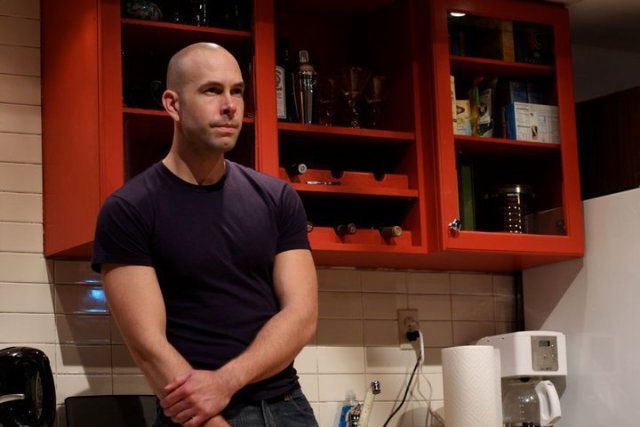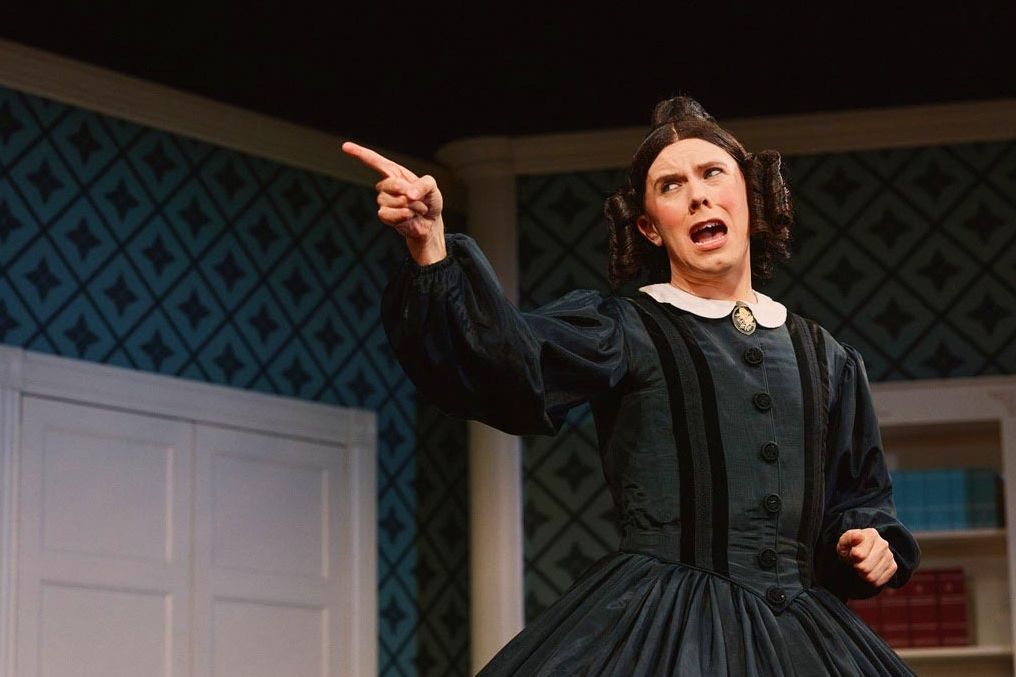Review: Dying City

Wade McCollum in his mercurial two-man role. In this shot, he seems to be portraying “Craig.”
The TV plays Law & Order, the coffeemaker slurps and burbles, the iPod hums a pop song, and a bag of popcorn sputters in the microwave. Newly-widowed military wife Kelly (Cristi Miles) has cloistered herself amid these simple conveniences, in an attempt to supress the pain of her husband Craig’s death.
It doesn’t help when Craig’s surviving identical twin, Peter, bursts into the apartment, giddy with manic intensity and flush with an irrepressible desire to discuss his brother. Kelly and Peter are obviously in different stages of grief—Peter, acceptance; Kelly, denial. Kelly tries to fend Peter off with vague pleasantries, but soon finds herself forced to face up to her husband’s memory, quite literally, as she looks at his twin.
Over the course of conversation, Kelly lapses into flashbacks featuring Craig. Wade McCollum plays both men, so one moment, he’s her gay actor brother-in-law, and the next, he’s her late straight soldier husband. The “three” of them touch on some of the tougher issues, including classism, infidelity, and the ethical complications of war. There are many tense moments where eyes lock together, and tough truths are unearthed during passionate spats.
What Works
All the onstage appliances work—and they also “work.” They legitimize the setting as a believable modern apartment, and they give the characters (especially Kelly) excuses to move throughout the scenes. Their various sounds also help keep the aural environment dynamic, when the whole play would otherwise just be two people talking.
Thank goodness Wade McCollum’s character transformations are rock-solid, because if they weren’t, the whole story would fall apart. Fortunately, he has such fluidity he can even change in plain view. It’s eerie to watch him pull his shoulders into a new posture, to hear him move even his breathing into a different timbre. As played by Wade, Craig isn’t the nicest guy, and Peter isn’t the easiest—but each is believable and each is unique.
Cristi Miles is equally convincing in her consistently mild-mannered evasiveness. And when she succumbs to emotion, she really sells it. Even in the intimate Portland Playhouse, her crying feels genuine. It’s always refreshing when an actor can throw vanity aside, in favor of a realistic crumple-faced cry.
The lighting, while seemingly simple and almost always “on,” serves a vital role, as a subtle shift of the dimmer often cues a scene change, and sometimes even cues a character change for McCollum. That mere lights can usher us between past and present, attests to their brilliance.
The script offhandedly mentions Long Day’s Journey Into Night when Peter announces he’s in town to play Edmund in a very high-brow local production. Perpetually dissatisfied with his work, Peter complaints that “It’s more like ‘Long Day’s Journey To The Hamptons,’” especially citing his older, more famous male costar. These references are bound to ring a bell with local thesp-heads, as Artists Rep just hosted a triumphantly toney production of Long Day’s Journey this summer, with none other than William Hurt in the aforementioned older/famous lead. Culturephile had to cross-check the script to make sure that this reference wasn’t a “fill-in-the-blank-with-a local-production” stunt, and it was not. At any rate, this makes the character Peter very believable as an “actor” by trade. One imagines he’s acting alongside William Hurt, right across town. It’s almost as though the character’s story “checks out.”
What Bugs
The scripted profanity is clunky. Now, Culturephile is no Tipper Gore; we know FCC-averse curses have a place in the arts. That said, profanity should always “roll trippingly off the tongue,” and Dying City‘s bid for a Pulitzer could well have been quashed by the oft-uttered phrase: “f*cked-her-so-hard-she.” The five-syllable show-stopper replaces every utterance of what would otherwise be a male character name. It’s hard for the actors to deliver, and it’s hard to hear. Even if they’d just doff the last word, “she,” it would drastically improve the flow. “F*cked-her-so-hard” should be blue enough for any budding Bukowski.
Speaking of authors, the script awkwardly name-drops authors. Several, including Faulkner and Freud. There’s even quite a bit of literal book-thumping in the blocking. This script would be smart enough already, without playing the library card.
Be forewarned: The ending is abrupt. Expect to be engrossed in a scene, only to have the lights come up and the show be suddenly over.
This show seems like it could just keep going, soap-opera style. Characters could keep fighting, unearthing more shocking discoveries and tackling more ethical dilemmas. And with this caliber of acting, one can imagine the characters living beyond the closing scene. Like the troubled relationships it portrays, this play will suck you in—and when it ends, you’ll be sorry.
Dying City runs through December 19 at Portland Playhouse. Use coupon code “facebook” to get five dollars off your ticket to Dying City. Good through the rest of the run. Available for advanced tickets only. For a more comprehensive list of events, visit PoMo’s Arts & Entertainment Calendar!




